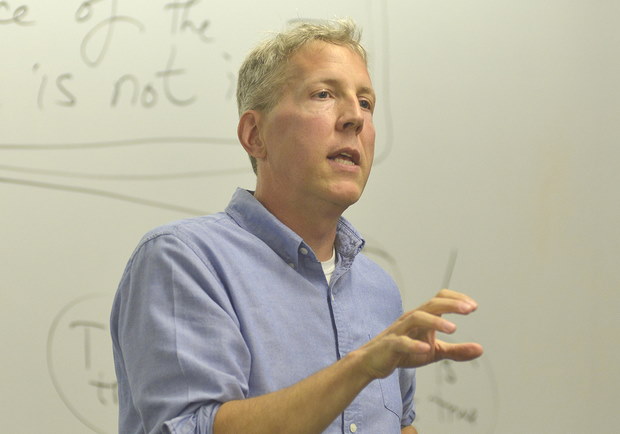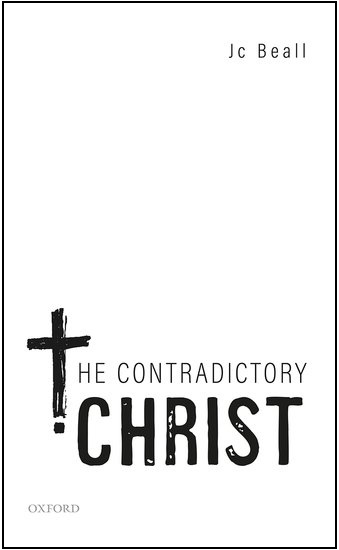
Consider the sentence “This sentence is false.” If it is true, then (as it says) it is false. And if it is false, then what it says (i.e. that it’s false) must be true. Why not, then, say that the sentence is both true and false?
In this episode Dr. Beall argues that if one says instead that the above sentence is neither true nor false, that may be plausible, but the same answer won’t work for this sentence: “This sentence is either false or neither true nor false (aka ‘gappy’).” If the sentence is true, this requires one side or the other of the disjunction to true – so it must be either false or neither. But if it can’t be both true and false, we must reject the first option. And we must reject the second option too, for if it is neither true nor false, then it can’t also be (as we’re supposing) true. It can’t then, be (only) true. But can it be either false or neither? It would seem not. Suppose it is false: that would require the falsity of both disjuncts, both that it is false (d’oh!) and that it is neither. So it can’t be false. Could it be neither true nor false? No – because if it were, then the second disjunct would be true, and thus the whole sentence would be true.

It would seem simpler to say that if the sentence is false, then (because the first disjunct would thereby be true) it will also be true. And if it is true – again, this requires at least one disjunct to be true. If we pick the first, then it will be both true and false. And if we pick that it is neither true nor false (the right disjunct) – then it won’t be true. So it looks like the one way for it to be true is for it to also be false, and that the only way for it to be false requires it also to be true. It looks like we should say that this sentence is both true and false.
Now if (1) for entirely non-theological reasons we have reason to believe that there can be true contradictions, and if (2) as Dr. Beall explained last time, all the attempts to make a divine-and-human Christ turn out consistent are problematic, and if (3) we have strong reasons to believe that Christ is both human and divine, then, as Dr. Beall argues here, why not just accept that the apparent contradictions of a divine-and-human Christ are not merely apparent but real, but nonetheless true (and false)?
Topics include:
- Why Dr. Beall doesn’t think relative identity theory helps.
- How people get the idea from a standard first university course in Deductive Logic that all contradictions are only false.
- The concepts of a logical vocabulary and of logic as universal and topic-neutral.
- Entailment relations generally, and the specific relation of logical consequence.
- The concept of logical possibility (which is broader than physical or metaphysical possibility).
- So-called “classical” logic as a controversial account of logical consequence, and why Dr. Beall rejects it.
- Truth-value “gaps” (where a claim is neither true nor false) and “gluts” (where a claim is both true and false).
- How the famous “liar paradox” supports the possibility of true contradictions.
- Why it won’t do to allow only truth-value gaps only, and not also gluts.
- The objection that contradictory christology ruins any hope of successful apologetic defense of the Incarnation.
- The objection that Christian tradition doesn’t allow for confessing certain claims as false.
- My objection that it is self-evident that nothing can be and not be a certain way at a single time – thus, there can’t be any contradictory beings, even if such are not ruled out by logic alone.
Do you agree that a doctrine of a divine-human Christ should be accepted even though it implies contradictions? Why or why not?
Links for this episode:

The Contradictory Christ (Amazon)
Dr. Beall’s homepage, page at Notre Dame
Relative Identity and Trinity theories
Joseph Jedwab, “Against the Geachian Theory of the Trinity and Incarnation“
podcast 68 – Dr. Harriet Baber on Relative Identity and the Trinity
podcast 271 – Does your Trinity theory require relative identity?
an intro to philosophy lecture on “common sense” and radical philosophical claims
(on open theism) – podcast 80 – Foreknowledge, Freedom, and Randomness
podcast 221 – Thomas Reid on human prejudices and common causes of error
podcast 220 – Thomas Reid on First Principles and Common Sense – Part 2
podcast 219 – Thomas Reid on First Principles and Common Sense – Part 1
podcast 263 – Tuggy vs. Date debate – Jesus is human and not divine – Part 1
This week’s thinking music is “The Atmosphere” by Little Glass Men.